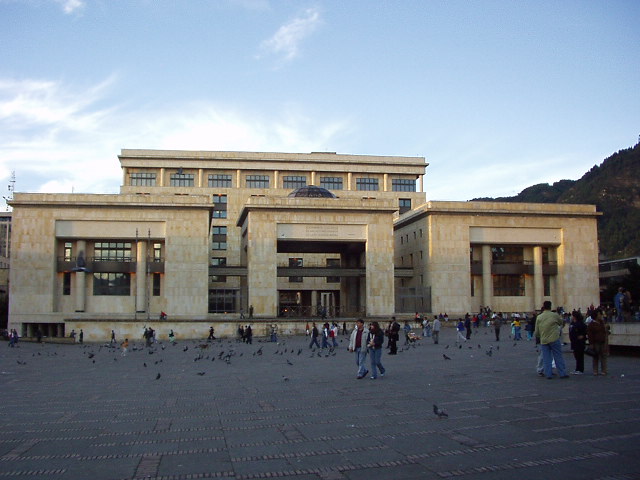This blog post is in furtherance to our earlier blog post titled “Wikimedia Wins in Colombia Lawsuit: Next Stop—the Constitutional Court of Colombia!” (read here).
In its first time considering Wikipedia, the Constitutional Court of Colombia has ruled that someone with a complaint about content should work through Wikipedia’s community processes first.
- Introduction
After a favorable verdict from the Criminal Court of Colombia in a case brought by Juan Pablo Gallo, Wikimedia asked Colombia’s Constitutional Court in June 2022 for a review, aiming to secure a favorable precedent regarding the intermediary liability and online encyclopedia landscape in Colombia. Acknowledging the novelty of the case and the unique nature of the Wikipedia model, the Constitutional Court admitted the petition and reaffirmed its commitment to Colombian citizens’ online civil liberties.
- Selection of the Case
In early 2022, Juan Pablo Gallo, a former mayor of Pereira who was accused of corruption, had filed a tutela [1] against the Wikimedia Foundation in an attempt to force certain takedowns and limit future editors’ ability to edit the Spanish language Wikipedia article about him. The lower court had dismissed the case based on intermediary protections, and had told Juan Pablo Gallo to send a formal request to the Foundation for changes, not fully understanding that the Foundation does not edit Wikipedia.
While the ruling favored the Foundation, it did not fully understand the projects and we believed there was an opportunity for a better and more far-reaching result. Thus, the Foundation approached the Constitutional Court to review the earlier decision. Happily, the Court agreed with us and found the tutela to be inadmissible. The Court ruled that rather than legally forcing a change through a tutela, the subject of an article that has a complaint about the content should at least work through Wikipedia’s community processes first before filing a lawsuit to try and force changes.
The Court found a few key topics important for its decision. First, it believed that Juan Pablo Gallo had waited too long, and that someone whose reputation is harmed should take action within a prudent and reasonable term from the date of the alleged violation. In this case, three years had passed from the date of publication of the content in question and the court action. Notably, the Court also observed that the fact that the information continues to be published does not necessarily mean that there is continuing harm to the person.
Second, the Court endorsed the Wikimedia community-led editorial process. It held that Juan Pablo Gallo’s efforts to self-edit the article about him were contrary to the policies and mechanisms set out by Wikipedia and, thus, did not qualify as neutral editing. This indicates that it was reasonable that they were not accepted by the community.
Third, the Court remarked that a special legal action like a tutela should serve as a last resort, and an applicant needs to seek protection through other available means prior to seeking defense through a tutela. For this purpose, the Court stated that the Wikimedia community-led model and policies in place to settle conflicts were broadly effective. It further noted that subjects of an article who believe that content about them is inaccurate or misleading can best address this by working with communities first—rather than trying to bypass their work by filing a lawsuit against the Foundation. Thus, it held that the present case did not meet the requirements of a tutela as Juan Pablo Gallo had not made a “real request” for withdrawal or amendment before the administrators, and also did not try to resolve the conflict as per the Wikimedia community rules.
Wikipedia’s community processes exist to ensure that information about living persons (i.e., Biographies of Living People or BLPs) is written with particular care: Articles about publicly notable subjects must have reliable and verifiable sources and be written from a neutral point of view. Although all articles are work in progress, subjects of an article who do encounter problems with what is written about them can raise the issue by providing information on Wikipedia article talk pages or by working with volunteer editors through email. Additionally, subjects of BLPs have several other avenues for resolving conflicts arising from the actions of editors as well, such as direct communication between the parties facilitated by Wikipedia, mediation by community members, convening of a review board (i.e., notice board), and approaching the dispute resolution board composed of unrelated editors.
- Conclusion
We believe that this ruling is in line with global best practices for protecting the work of individuals sharing knowledge online. This landmark judgment is crucial for protecting the ability of different websites and different language communities—including Wikipedia and the other Wikimedia projects—to create their own processes for effectively balancing the rights to freedom of expression and information with the dignity of subjects of articles in order to reach good outcomes across many cases.
This case is a victory for community-led content moderation, and it should serve as an important precedent when other countries develop their constitutional principles and jurisprudence on how to balance complaints about article content. Through his landmark verdict, the Constitutional Court of Colombia has taken an important step in driving the global discussion of balancing individual reputation and the right of platform readers and volunteer editors to access and collaboratively share information online.
[1] Tutela refers to the right to seek an exceptional remedy for violation of a fundamental right. See https://es.wikipedia.org/wiki/Acci%C3%B3n_de_tutela.

Can you help us translate this article?
In order for this article to reach as many people as possible we would like your help. Can you translate this article to get the message out?
Start translation
